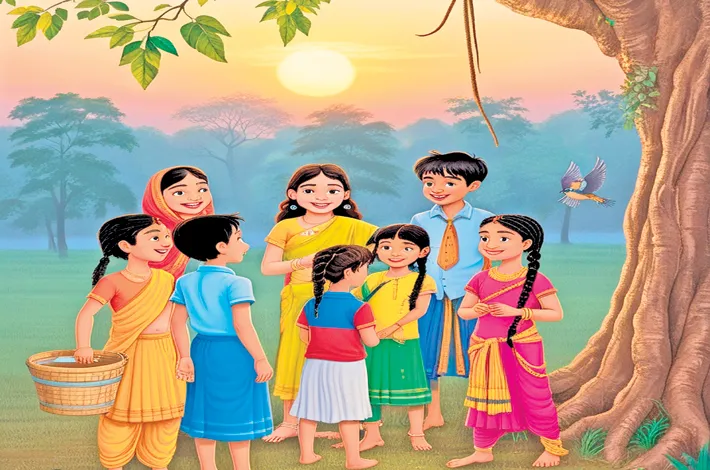Maya's River of Dreams
28-10-2025 12:00:00 AM

In the dusty lanes of Shivpur village, just a stone's throw from the ancient spires of Jaunpur and the holy whispers of Benaras across the Gomti River, lived a girl named Maya. At ten years old, Maya was a whirlwind of curls and curiosity, with eyes as bright as the diyas that floated on the river during festivals. Her home was a mud-brick hut with a thatched roof, where her grandmother spun tales of kings and poets who once wandered these lands. But Maya dreamed bigger than stories—she dreamed of a village that sparkled like the jewels in the Atala Masjid.
One sweltering afternoon in the month of Sawan, Maya skipped down to the riverbank with her favorite clay pot balanced on her hip. The Gomti was her playground, where she chased minnows and built castles from wet sand. But today, something was wrong. Plastic bottles bobbed like sad ghosts among the lotus leaves. Wrappers from roadside chai stalls tangled in the reeds, and a foul smell hung in the air like a forgotten promise. "Oh no," Maya whispered, her heart sinking like a pebble. Upstream, the village streets were no better—piles of garbage choked the alleys, drawing flies and turning playtime into a game of dodge-the-mud-puddles.
That evening, as the sun dipped behind the mango groves, Maya gathered her friends under the old banyan tree. There was Ravi, her cheeky neighbor with a grin wider than the river, always ready for mischief. Priya, the quiet artist who could draw birds that seemed to flutter off the page. Little Arjun, shy as a sparrow but strong as a bullock, who carried water buckets without spilling a drop. And Sita, the bold one with braids like ropes, who knew every folk song by heart.
"Look what I found today," Maya said, holding up a crumpled plastic bag from her pocket. She told them about the dirty river, her voice rising like a monsoon wind. "Our Gomti is crying! And our streets? They're like tangled hair after a long sleep. If we don't clean them, how will the fish swim? How will we play without stepping in slop?"
Ravi kicked at a root. "But Dadi says it's the grown-ups' job. They throw the trash—let them pick it up!"
Maya shook her head, her curls bouncing. "No, Ravi. We're the village's tomorrow. If we show them, they'll follow. Let's make a Clean Gomti Club! We'll teach everyone to keep our homes tidy and streets shining."
The others exchanged glances, then nodded. Priya's eyes lit up. "I can draw posters!" Arjun mumbled, "I'll... help sweep." Sita clapped. "And songs! We'll sing about the lazy river that got grumpy!"
The next morning, the Clean Gomti Club sprang to life in Maya's backyard. Under the neem tree, they brainstormed like little generals. Priya sketched colorful posters on old newspapers: a happy fish waving from a crystal-clear river, with bold red letters saying, "Tidy Home, Happy Gomti—Throw Trash in Bins, Not in Dreams!" Maya painted the words with turmeric water for that golden glow. Ravi collected bamboo sticks to make signs, while Arjun hammered nails with a rock—clumsy but determined. Sita composed a tune to an old bhajan: "Oh villagers dear, listen to our plea, Keep your street clean, as clean as can be! No peels on the path, no bottles in the stream, Together we'll make our village a dream!"
By noon, their arms were sticky with glue from rice paste, and laughter echoed like temple bells. But Maya knew ideas needed wings. "We start small," she declared. "Door to door in our lane first."
They marched out, a parade of five with posters hoisted high. At the first hut, old Uncle Hari was dozing on his charpoy, surrounded by onion peels and betel nut spits. Maya cleared her throat. "Namaste, Uncle! See this?" She held up her poster. The fish winked in the sunlight. "Our river is choking. If we all sweep our doorsteps and use the big bin by the temple, it'll sparkle again!"
Uncle Hari scratched his beard, chuckling. "Arre, little general, what do you know of work?" But Sita burst into song, her voice clear as a flute. The tune was catchy; even the chickens pecked in rhythm. Priya drew a quick fish on a scrap of paper and gifted it. Arjun shyly offered to sweep right then. Before long, Uncle Hari was on his feet, broom in hand. "Bas, bas! For you rascals, I'll try."
Word spread like wildfire in dry grass. The next day, the club ventured to the weekly haat, the bustling market where Jaunpur's spice sellers met Benaras's silk traders. Stalls overflowed with mangoes, jalebis, and brass lamps, but the ground was a mosaic of peels and wrappers. Maya climbed onto an empty crate. "Bhaiyas and didis! Listen!" Heads turned. "Our Gomti gives us life—fish for dinner, water for baths. But we're killing her with trash! Join our Clean Gomti Club. Sweep your shops, teach your kids!"
Ravi and Arjun handed out mini-posters, while Priya sketched on the spot for anyone who smiled. Sita led a chorus, and soon, children from other lanes joined in, clapping and swaying. A fruit vendor auntie, moved by the song, donated a sack for trash collection. "Beta, you're right. My peels go in here now!"
But not everyone was easy to convince. At the potter's colony, grumpy Potter Ji scowled. "Go play, kids! Rivers clean themselves in rains." He tossed a broken shard toward the drain. Maya's group didn't back down. They organized a surprise: a street play under the full moon. Dressed in old saris and turbans, they acted out "The Grumpy Gomti." Maya played the river, wailing dramatically as Ravi (the trash monster) piled on fake garbage from leaves and cloth. Priya's drawings came alive as props—a sparkling before and a muddy after. Sita narrated in rhyme, and Arjun, finding his voice, roared as the awakened village that swept it all away.
The play drew a crowd—potters, weavers, even the chaiwala from the bridge. Laughter turned to gasps, then cheers. When the "river" rose clean and sparkling, the audience clapped thunderously. Potter Ji wiped his eyes. "Achha, Maya. Tomorrow, we start bins at every wheel."
Days blurred into a joyful whirlwind. The club grew—twenty kids now, with clean-up races where the fastest sweeper won a handmade medal from Priya's sketches. They planted marigolds along the lanes, turning mud into golden borders. Maya led chants at school: "One sweep for home, two for the street, three for the river—oh, what a treat!" Villagers watched, then joined. Uncle Hari's lane gleamed. The market auntie started a "No Litter Haat" rule. Even the stray dogs seemed happier, tails wagging over tidier paths.
One evening, as fireflies danced like tiny stars, Maya and her friends sat by the Gomti. The water lapped clear, minnows darting free. "We did it," Ravi whispered, awed. Maya smiled, hugging her knees. "Not us alone. Everyone. But remember—it's not done. Keep dreaming big."
From that day, Shivpur whispered of the girl who led with a broom and a song. Travelers from Jaunpur to Benaras carried tales of the Clean Gomti Club, sparking ripples in other villages. Maya learned that leadership wasn't about being the loudest— it was about lighting a spark in hearts, one tidy street at a time. And as the moon rose over the Gomti, she knew her river's dreams were just beginning.








